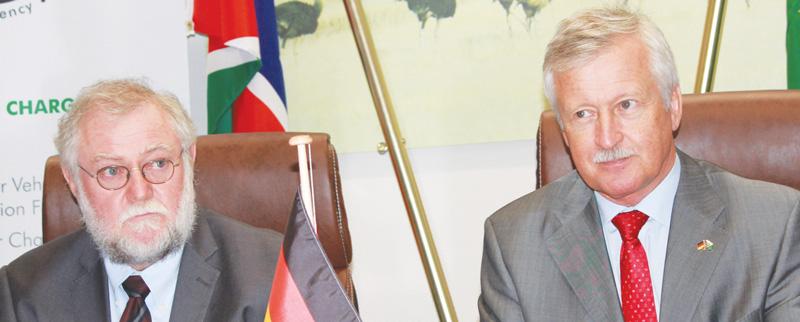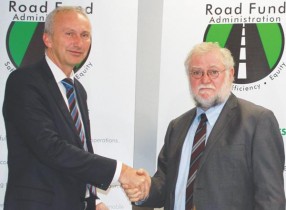
German loan expands road network


Mr Helmut Gauges (left), the Director General for Africa and the Middle East of the Kreditanstallt fuer Wiederafbau, the equivalent of a German Development Bank, with Hon. Calle Schlettwein, the Minister of Finance.
Earlier this week, the Minister of Finance, Hon Calle Schlettwein signed an agreement with representatives of the German Federal Government and the Kreditanstallt fuer Wiederafbau (KfW) for a Euro30 million concessional loan to continue improvement of the road network, to boost tourism infrastructure in the Zambezi region, and to facilitate land reform.
The agreement was sealed shortly before the German delegation departed for a familiarisation tour to the northern regions accompanied by the German Ambassador, HE Christian Schlaga, the Chief Executive Officer of the Roads Fund Administration (RFA), Mr. Ali Ipinge, and the Director General for Africa and the Middle East of KfW, Mr Helmut Gauges.
The concessional loan will be used to finance priority roads projects through the RFA and implemented by the Roads Authority. By providing an interest subsidized loan, Germany will assist the government to expand the scope of road network extension and improvement.
One specific project funded under the programme is the ongoing rehabilitation and extension of the Windhoek Okahandja road which is under tremendous traffic carrying both commuters and cargo. It is notorious for its number of accidents when traffic peaks at around 18,000 vehicles per day.
This week’s agreement includes an extension clause to extend the loan facility in a 2nd phase with an additional Eruo30 million Euro (approx. N$450 million) for transport infrastructure.
At the signing ceremony it was emphasized that the road network in Namibia is the backbone of the economy. Especially due to the size of the country, which is nearly triple the size of Germany, and the low population density, the national market is very dependent on transport.
For the rest of the week, Mr. Gauges visited Ohangwena, Kavango West and Zambezi to inspect labour-based road construction projects and the progress with communal land development.
Labour-based constructed roads under this programme total more than 1,000 km of the new rural roads in Owamboland with total investments of more than N$3 billion, cofinanced by the Namibian and German governments. A large portion of this construction is contracted to SMEs using labour-based methods instead of machinery.
On the Communal Land Reform Programme, implemented by the Ministry of Land Reform, 151,008 communal land rights have been mapped and digitalized; representing 77% of communal land rights nationally, and 78,629 customary land rights certificates have been issued. This provides security of tenure to some 450,000 rural residents. Furthermore, the development of infrastructure is ongoing on 260,000 ha in communal areas so that 7,800 dependants in farming households can derive benefit from improved production. Germany supports this programme together with the European Union with a total amount exceeding N$450 million.
On Wednesday Mr. Gauges together with the Minister of Works and Transport, Hon. Alpheus Naruseb, and the German Ambassador attended the ground breaking ceremony for the construction of the new “German Wing” on the UNAM campus in Ongwediwa which will accommodate the Faculty of Engineering & Information Technology. This investment totals N$195 million.
On Thursday, Ambassador Schlaga attend the transfer of a wastewater treatment plant in Outapi. Approximately 40% of the urban population does not have access to sanitation facilities, therefore the plant combines the re-use of water, with the byproducts of fertilisers for agriculture and energy generation in a community-based approach. As part of this project, special attention is paid to changing personal behaviour to improve hygiene to prevent the proliferation of waterborne diseases.
Mr. Gauges continues his visit on Thursday and Friday to the Zambezi region to pay a visit to the UNAM Campus in Katima Mulilo where the planning stage for the extension of the Department of Wildlife Management and Ecotourism will start soon. Thereafter he will visit the national parks in Zambezi and Babwatwa to get an overall view of existing park infrastructure where park stations, houses for staff members and roads were built, co-financed by Germany. These funding programmes include financial support for rural conservancies.










































